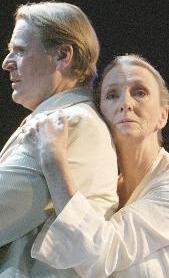SEARCH CurtainUp
REVIEWS
FEATURES
NEWS
Etcetera and
Short Term Listings
LISTINGS
Broadway
Off-Broadway
BOOKS and CDs
OTHER PLACES
Berkshires
London
LA/San Diego
DC
Philadelphia
Elsewhere
QUOTES
On TKTS
LETTERS TO EDITOR
FILM
LINKS
MISCELANEOUS
Free Updates
Masthead
Writing for CurtainUp NYC Weather
Five by Tenn
|
You know, there's nothing I dread more than trying to tell about a play. A play only exists on the stage. --- The Writer, a Tennessee Williams stand-in whose between play commentary not only pulls these five one-acts together but imbues them with enormous charm and wit. |

Jeremy Lawrence as The Writer
(Photo: Joan Marcus )
|
When scholars Nick Moschovakis and David Roessel found more than a dozen one-acters (again in the Texas U. archives) and DC Shakespeare Theatre's artistic director Michael Kahn found them interesting enough to think about how best to present the most stageworthy. The result was a five-play anthology -- four chosen from the newly unearthed scripts, and one previously produced as a teleplay. Last year, the Williams evening, cunningly titled Five by Tenn proved to be a hot ticket. (DC production review).
The anthology has traveled from the Beltway to Manhattan Theatre Club's small second stage. Director Kahn, who again directs, has kept three of the original quintet, but substituted two -- probably, to make this evening more of a showcase for Kathleen Chalfant and her new to this production colleagues Penny Fuller and David Rasche. I agree that more of Chalfant is better than less. Fuller and Rashe are quite fine, as are Cameron Folmar and Myk Watford in their reprise of in And Tell Sad Stories of the Deaths of Queens, the only play to throw off the chronological presentation order. However, this newly configured evening is hardly likely to stir audience enthusiasm as much as the one at the Kennedy Center. In appraising the evening overall, it's the intra-scene bits and pieces with Jeremy Lawrence as a narrator and Williams stand-in are more interesting than the plays themselves
Lawrence's somewhat too hammy Writer looks amazingly like Williams. His monologues, forged from Williams' stage direction, notes and autobiography, shed some light on the choice of these plays to create a picture of different aspects of the playwright's personality and emerging voice. As Lawrence flirtatiously chats up the audience, the actors silently and unobtrusively change the props for the next play, a directorial magic trick that works quite well.
The plays are another matter. The two first up, and the post intermission curtain raiser, have a fragmentary, unfinished playwright quality that would probably be less obvious if they were short stories, a genre in which Williams excelled. The opening piece, Summer at the Lake (1938), presented in DC as Escape, has Penny Fuller playing a smothering, self-absorbed mother in whom anyone familiar with The Glass Menagerie will recognize a nascent Amanda Wingate. The usually elegant Kathleen Chalfant is amusing as a bent-over servant with an unidentifiable accent who must bring the predictable moment of truth about the sensitive son's (Cameron Folmar) casual swim.
The Fat Man's Wife (1939) is about Vera Cartwright (Chalfant), a rich Manhattanite of an uncertain age who is married to the title character (David Rasche, plumped up almost as much as Edna Turnblatt in Hairspray) who not only indulges his appetite for food but for sexual dalliances. When an idealistic young writer begs her to come away with him and really live, Mrs. Cartwright is tempted, but realism prevails. This seems to be a case of Williams trying his hand at the Noel Coward style marital drama. It's a rather feeble attempt and the evening's slightest piece, with more of a woman's magazine fiction than play sensibility.
The Writer's introductory comments to And Tell Sad Stories of the Deaths of Queens (1959) are particularly pertinent: "I've read things that say Blanche [of Streetcar Named Desire fame] was a drag queen. These charges are ridiculous! If I am writing a female character, goddamnit, I'm gonna write a female character. I'm not gonna write a drag queen! If I wanna write a drag queen, I'll write a drag queen, and I have written one as a matter of fact." Cameron Fomar is terrific as that aging, lonely drag queen and, the Writer's comments notwithstanding, audiences are sure to see strong traces of Blanche in his portrayal. There's also a whiff of Stanley Kowalski in Myk Watford's brutal Karl. The two scenes could conceivably have been built into a full-length play -- though come to think of it, we nowadays have plenty of hour-long plays billed as the sole item on theatrical menus. When preceded by two slim offerings, however, And Tell Sad Stories of the Deaths of Queens comes off as too long as a one-acter and not quite substantial enough to stand on its own -- though it does showcase Jame Noone and Catherine Zuber's set and costume designing skills.
In Adam and Eve on a Ferry, Chalfant, Fuller and Rasche transform themselves once again. Chalfant is wasted as a sensuous, brunette Frieda Lawrence, who might have stepped out of the pages of one of her husband, D. H. Lawrence's novels. She comes and goes briefly to usher in a flustered American woman (Fuller) who sees Lawrence (Rasche) as someone to whom she can "bare her soul." Lawrence, confined to a wheelchair by a degenerative disease, is indeed receptive to her obsession with a missed opportunity for a sexual encounter and uses his inventive skills to guide her to a happy ending. Once again this seems more a short story (what they used to call a short short) than a play. The acting honors belong mostly to Rasche, with Fuller mainly his foil and Chalfant playing the equivalent of a walk-on part.

Kathleen Chalfant and David Rasche in "I Can't Imagine Tomorrow"
(Photo: Joan Marcus ) |
Ultimately, one leaves the theater speculation on how Tennessee Williams would feel about having directors eager to capitalize on the enduring popularity of his best plays rummage through his papers to give life to works probably not intended for public viewing. While he would probably be pleased to have audiences get another look at the 1970 teleplay, and have them see And Tell Sad Stories of the Deaths of Queens as a forerunner to an era when such stories are no longer rare or daring, this show and tell of his juvenalia scribbling would most likely make him blush.
For more information about Tennesse Williams work and links to other Williams plays reviewed, see our Tennessee Williams backgrounder
| Five By Tenn One-act plays by Tennessee Williams Directed by Michael Kahn Cast: Kathleen Chalfant, Cameron Folmar, Penny Fuller, Hunter Gilmore, Jeremy Lawrence, David Rasche, Robert Sella and Myk Watford. Jeremy Lawrence appears between plays as The Writer, a figure based on Williams' writings. Summer at the Lake (Performed under the title Escape at the Kennedy Center) Kathleen Chalfant (Anna), Cameron Folmar (Donald Fenway) and Penny Fuller (Mrs. Fenway). The Fat Man’s Wife Kathleen Chalfant (Vera Cartwright), David Rache (Josie Cartwright) and Robert Sella (Dennis Merriweather). And Tell Sad Stories of the Deaths of Queens Myk Watford (Karl), Cameron Folmar (Candy Delaney), Hunter Gilmore (Alvin Krenning) and Robert Sella (Jerry Johnson). Adam and Eve on a Ferry Kathleen Chalfant (Frieda), Penny Fuller (Visitor) and David Rasche (Lawrence). I Can’t Imagine Tomorrow Kathleen Chalfant (One) and David Rasche (Two) Set Design: James Noone Costume Design: Catherine Zuber Lighting Design: Traci Kleiner Sound Design: Scott Killian Original Music:Adam Wernick Running time: 3 hours, includes one intermission Manhattan Theatre Club, Stage II at NY City Center, 131 West 55th Street (212) 581-1212 From 10/19/04; opening 11/11/04. Tuesday through Sunday at 7:30 PM, with matinees on Saturday and Sunday at 2:30 PM. Tickets are $48 ( $25 student tickets on sale for all performances based on availability, on the day of the performance, up to one hour before show time.Reviewed by Elyse Sommer based on November 6th press performance Final performance 12/19/04 |

Retold by Tina Packer of Shakespeare & Co.
Click image to buy.
Our Review

Mendes at the Donmar
Our Review

At This Theater

Leonard Maltin's 2003 Movie and Video Guide

Ridiculous!The Theatrical Life & Times of Charles Ludlam

6, 500 Comparative Phrases including 800 Shakespearean Metaphors by CurtainUp's editor.
Click image to buy.
Go here for details and larger image.



